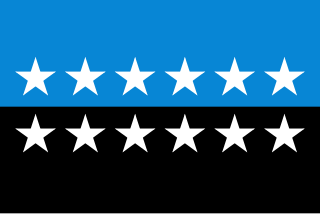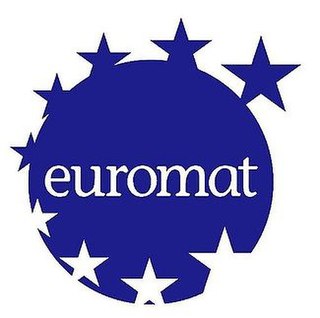
The European Coal and Steel Community (ECSC) was an organisation of six European countries created after World War II to regulate their industrial production under a centralised authority. It was formally established in 1951 by the Treaty of Paris, signed by Belgium, France, Italy, Luxembourg, the Netherlands, and West Germany. The ECSC was the first international organisation to be based on the principles of supranationalism, and started the process of formal integration which ultimately led to the European Union.
A trade union, often simply called a union, is an organization of workers who have come together to achieve many common goals, such as protecting the integrity of their trade, improving safety standards, and attaining better wages, benefits, and working conditions through the increased bargaining power wielded by the creation of a monopoly of the workers. Trade unions typically fund the formal organization, head office, and legal team functions of the trade union through regular fees or union dues. The delegate staff of the trade union representation in the workforce are made up of workplace volunteers who are appointed by members in democratic elections.

The economy of Norway is a highly developed mixed economy with state-ownership in strategic areas. Although sensitive to global business cycles, the economy of Norway has shown robust growth since the start of the industrial era. The country has a very high standard of living compared with other European countries, and a strongly integrated welfare system. Norway's modern manufacturing and welfare system rely on a financial reserve produced by exploitation of natural resources, particularly North Sea oil. According to United Nations data for 2018, Norway together with Luxembourg, and Switzerland are the only three countries in the world with a GDP per capita above US$70,000 that are neither island nations nor microstates.
The pulp and paper industry in Europe accounts for about a quarter of world production and is a major employer. The leading producing countries are Finland, Sweden and Germany. The industry is a large user of renewable energy and achieved a recycling rate of 71.5% in 2015.

The Confederation of Swedish Enterprise or Swedish Enterprise is a major employers' organization for private sector and business sector companies in Sweden. It has 49 member associations representing 60,000 member companies with more than 1.6 million employees.

The National Union of Rail, Maritime and Transport Workers is a British trade union covering the transport sector. It is currently presided by Michelle Rodgers and its current general secretary is Mick Cash.

Ship-breaking is a type of ship disposal involving the breaking up of ships for either a source of parts, which can be sold for re-use, or for the extraction of raw materials, chiefly scrap. Modern ships have a lifespan of 25 to 30 years before corrosion, metal fatigue and a lack of parts render them uneconomical to operate. Ship-breaking allows the materials from the ship, especially steel, to be recycled and made into new products. This lowers the demand for mined iron ore and reduces energy use in the steelmaking process. Fixtures and other equipment on board the vessels can also be reused. While ship-breaking is sustainable, there are concerns about the use by poorer countries without stringent environmental legislation. It is also labour-intensive, and considered one of the world's most dangerous industries.

Environmental dumping is the practice of transfrontier shipment of waste from one country to another. The goal is to take the waste to a country that has less strict environmental laws, or environmental laws that are not strictly enforced. The economic benefit of this practice is cheap disposal or recycling of waste without the economic regulations of the original country.
The Confederation of European Paper Industries (CEPI) is the pan-European association representing the forest fibre and paper industry.
The Retail Motor Industry Federation (RMI) represents the interests of motor industry operators in England, Wales, Northern Ireland and the Isle of Man providing sales and services to motorists and businesses. It does not represent businesses in Scotland, which are represented by the independent Scottish Motor Trade Association.

The European Gaming and Amusement Federation (EUROMAT) is a Brussels-based federation of European trade associations representing the gaming and amusement industry at European Union level.
The European Travel Commission (ETC) is an association of National Tourism Organisations (NTOs) based in Brussels. It was created in 1948 to promote Europe as a tourist destination to long-haul markets outside of Europe, originally the US and later Canada, Latin America and Asia-Pacific. ETC currently has 33 member NTOs and 14 associate members from the private industry. The association aims to raise awareness of the importance of tourism among national European authorities and the general public through sharing best practices and cooperation in market intelligence and promotion.

Vehicle recycling is the dismantling of vehicles for spare parts. At the end of their useful life, vehicles have value as a source of spare parts and this has created a vehicle dismantling industry. The industry has various names for its business outlets including wrecking yard, auto dismantling yard, car spare parts supplier, and recently, auto or vehicle recycling. Vehicle recycling has always occurred to some degree but in recent years manufacturers have become involved in the process. A car crusher is often used to reduce the size of the scrapped vehicle for transportation to a steel mill.
As a trade association, the British Metals Recycling Association (BMRA) represents over 300 organisations working across UK’s metal recycling sector. Its website also helps members of the public to find a local metal recycling organisation. It is based in Cambridgeshire, England.
Friends of the Earth Europe (FoEE) is the European branch of the world's largest grassroots environmental network, Friends of the Earth International (FOEI). It includes 33 national organizations and thousands of local groups.

The Organisation for Economic Co-operation and Development is an intergovernmental economic organisation with 37 member countries, founded in 1961 to stimulate economic progress and world trade. It is a forum of countries describing themselves as committed to democracy and the market economy, providing a platform to compare policy experiences, seek answers to common problems, identify good practices and coordinate domestic and international policies of its members. Generally, OECD members are high-income economies with a very high Human Development Index (HDI) and are regarded as developed countries. As of 2017, the OECD member countries collectively comprised 62.2% of global nominal GDP and 42.8% of global GDP at purchasing power parity. The OECD is an official United Nations observer.
Euroseeds is a trade association for the seed industry in the European Union and the European Economic Area. An umbrella organization of national seed associations and individual seed companies, their members represent all aspects of the European seed industry including research, plant breeding, and the production and marketing of seeds of agricultural, horticultural and ornamental plant species. It was founded in November 2000 and was granted the legal status of international non-profit International Association (AISBL) according to Belgian law in April 2002. Its headquarters are located in Brussels, Belgium.
COCERAL is a European association, representing the trade in cereals, rice, feedstuffs, oilseeds, olive oil, oils and fats and agrosupply.
The European Diving Technology Committee eV. (EDTC) is an association registered in Kiel, Federal Republic of Germany for the purpose of making professional diving safer by creating international standards. Membership is open to all countries of the continent of Europe, with each country having one representative from the medical, industrial, government and trade union sectors. Some major diving industry associations are also involved. As of May 2016, 22 nations and 6 international non-governmental organisations were represented in the EDTC.









